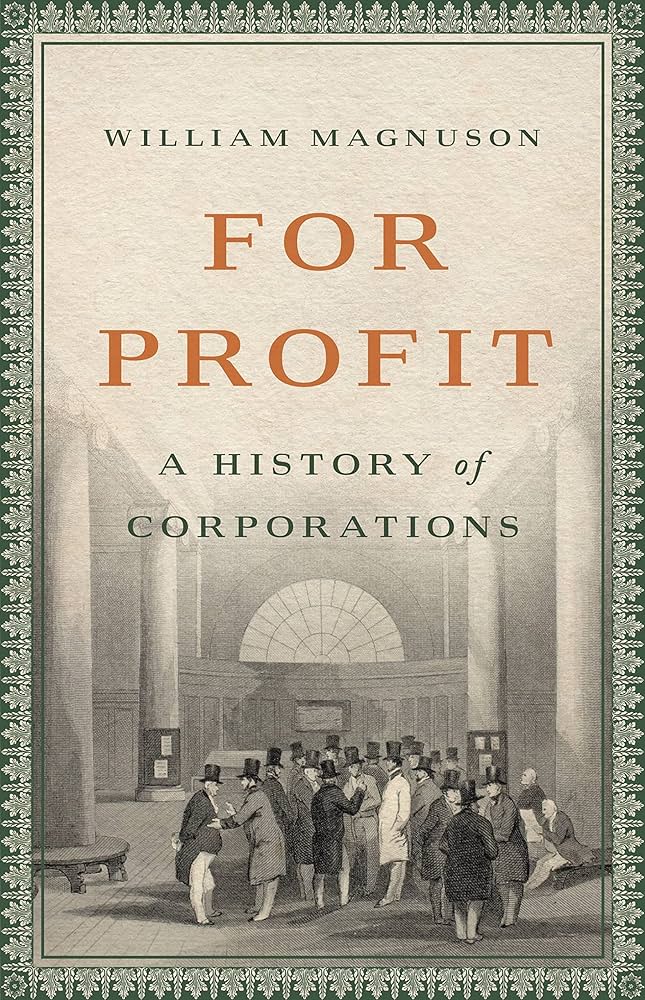
As Democrats point fingers of blame for the November election results at each other and all manner of other villains, one consistent bogeyman for the progressive wing of the party over the years has been “corporations.” So perhaps it is worth thinking carefully about what corporations are and aren’t.
Legal scholar William Magnuson’s book, For Profit, traces the history of the corporation as one form of social organization, from ancient Rome to today. One of his central theses is that the interests of the state and of corporations are intertwined. He writes:
The purpose of corporation is, and has always been, to promote the common good. Corporations have existed for thousands of years and have sprung up in radically different social contexts and milieus, but they have always been closely connected to the state and its interests. …
But just because corporations were created to protect the interests of society does not mean that they will, in fact, end up doing so. History is littered with examples of them failing spectacularly in this respect. …
Is it inevitable that corporations will always fall into vice and greed? … I would argue that the answer … is no. Throughout history corporations have demonstrated a remarkable ability to channel human effort into productive enterprise. … There is roguery here, to be sure, but there is also something mystical. The corporation is, at its heart, a testament to the power of cooperation, of people working together toward a common goal. Corporations work economic miracles because people can accomplish more working together than can apart. This is a cause for celebration … (pp.297-299)
The bolded portions (my emphasis) of this excerpt will sound jarringly wrong to readers who see the corporate form as little more than a legal device to mask fraud — that is, as a way for holders of capital to siphon wealth from consumers at the expense of the public interest. Social and ideological media feed broad-brush negative generalizations about corporations, and amplify feelings of resentment and anger toward them and their leaders. That anger can reach disturbing levels, as evidenced by the outpouring of “gleeful” support on social media for the assassin who shot an insurance company CEO in the back recently, killing him. (See e.g., here, here, here, here, here, here, and here.)
To be fair, economics textbooks portray business firms as unitary actors for whom maximizing shareholder returns trumps all other concerns. Adam Smith famously argued that when business people try to do good by society they are likely to fail, and that usually businesses do more social good by pursuing their self-interest. Two hundred years later Milton Friedman echoed Smith by arguing that the only social responsibility of business is to maximize profit within the bounds of the law.
In 2009 The Economist fleshed out these ideas a little bit more sophisticatedly when it argued that firms’ social responsibility expenditures can be divided into three categories: (1) those that save the company money while doing good, like using energy more efficiently; (2) those that cost money in the near term but avoid longer term risk, and (3) those that neither save money nor reduce risk, but benefit people external to the firm. According to The Economist, firms should have been doing the actions in category #1 anyway, and those in category #3 amount to managers spending other people’s money. Only category #2 is interesting and debatable, in their eyes.
No wonder so many people conclude that corporations are systematically indifferent to the broader social good, and that when corporations invest in ESG initiatives, they are engaging in “greenwashing” for economic reasons.
There is a logic to that sentence. If corporations were in fact nothing more than single-minded wealth-maximizers, then all corporate decisions — including decisions about matters of environmental and social governance (ESG), or about compliance with the law — must be wealth maximization decisions. Taking this logic one step further, wealth-maximizing firms could also be expected to comply with the law only when the expected value of compliance is greater than the expected value of noncompliance. That is, they would coldly weigh compliance costs against the penalties for noncompliance (fines x probability of getting caught). As I noted years ago, many people hold that picture of firms in their mind’s eye, but that is not how corporate compliance decisions work.
Nor is all ESG activity greenwashing. When Royal Dutch Shell invited a journalist to a company planning meeting focused on the energy transition, the journalist wrote a piece characterized the company’s plans to pivot toward lower carbon energy sources as “profiting from climate change.” One has to read deep into the article to get to the writer’s description of Shell’s surprisingly (to him) ambitious predictions about the speed of the transition, and to this:
This may seem like a progressive outlook and a surprising one for a fossil-fuel company that has faced the ire of climate protesters so directly. But Shell doesn’t seem to see the climate movement as the enemy or even necessarily contrary to the company’s interests.
Some in the climate coalition are uncomfortable with corporate ESG efforts, even sincere ones. Former Labor Secretary Robert Reich has criticized corporate ESG on the grounds that it reduces political pressure for government to regulate, or otherwise complicates that process. Similarly, my friend Shelley Welton has argued that corporations should not be encouraged to … pursue net zero [carbon emissions] pledges” because ad hoc voluntary pledges could have harmful distributional impacts compared to government-organized negative emissions policies.
Welton argues that corporate pledges to achieve net zero carbon in the future are not just empty, they are harmful. She says: “There is nothing neutral about a decision to allow uncoordinated … undemocratic entities to decide the trajectory of climate change policy.” But it isn’t clear (to me, at least) that anyone is deciding that. It may be that the human beings in these firms see private action as a response to the absence (or unlikelihood) of a collective regulatory decision? None of which is to deny the imperfection of the voluntary carbon offset markets on which many corporate net zero pledges depend. Biosequestration is particularly susceptible to empty promises of permanent sequestration. (There are some proposals to make those kinds of climate pledges more credible, but so far these are just proposals.)
We don’t know if private ESG action is deterring government action, or is instead a response to government inaction. Might both motives be present at different firms, or even at the same firm? Stated differently, it seems that defenders and critics of ESG base their conclusions on polar opposite assumptions about the (yet to be written) future.
Writers who equate ESG with “greenwashing” have to grapple with the fact that there are far more corporate resources devoted to ESG — and to minimizing firms’ climate impacts — than one would expect from corporations following the single-minded, shareholder-wealth-maximizing model. In Climate of Contempt I quote Carnegie Mellon University climate scientist Ken Caldeira’s surprise at “how much corporate decarbonization activity is being driven by reputational concerns, customer preference and the simple desire to do good.” The same is true of compliance behavior. Most business firms tend to comply with regulations even when they could get away with noncompliance.
Why? Because those decisions are not made by “firms.” They are made by people. The behavior of people is influenced by laws and social norms, and corporate decision-makers usually see themselves and their organizations as law-abiding.
While voluntary corporate action that goes beyond compliance may be suboptimal compared to some regulatory ideal, that ideal may not come to pass in the foreseeable future, particularly given today’s deadlocked, dysfunctional Congress and unreceptive judiciary. In the meantime, corporate voluntary action may represent an improvement over the status quo.
More generally, when it comes to the tension between maximizing profit and doing social good, different firms do things differently — even within the same industry. For example, while the oil industry’s largest trade association looks forward to the Trump Administration’s repeal of many of the Biden Administration’s climate policies, ExxonMobil opposes US withdrawal from the Paris Agreement and broad repeal of the Inflation Reduction Act. Similarly, most automakers oppose repeal of the Biden EV tax credits, except for Toyota. And unlike most other big banks, JP Morgan is seeking to finance closure of coal-fired power plants for climate reasons. Voters today are constantly invited by ideological and social media to engage in the fallacies of composition and division, and one-size-fits-all descriptions are almost always wrong.
The economic accomplishments of corporations produce both social benefits and social costs. Here at the University of Texas I teach students who go to work for corporations in the renewables business, the oil and gas business, and just about every other kind of energy business. As I recently told a colleague from another state, working at UT puts “a human face” on these corporations that many people never see. Most people are predisposed to act responsibly. Indeed, it ought not to stretch credulity to note that some utility and fossil fuel executives are sincerely proud of their firms’ efforts to pivot toward a cleaner energy future. But that idea is reflexively ridiculed in some social media communities.
Still, managers’ social instincts butt up against economic pressures, which is how corporate scandals happen. And modern economic theory seems to excuse this. William Magnuson again:
Somewhere along the line, between Adam Smith and today, the connection between the corporation and the public good became obscured. Today, not only is it considered not obvious that corporations should consider the public good, but it is even considered quite controversial. …
[U]nleashed from their guiding purpose, corporations have the capacity to do great harm. … I for one hope that we will rediscover the vision of the corporation as an engine for the common good. (pp. 302-303)
Still, says Magnuson, corporations are people, working together, sometimes doing great things.
… [T]he corporation has been behind humankind’s greatest creations. … It provided the energy that powered the twentieth century’s path to unparalleled prosperity and the finance that helped pay for it. …
What’s more, corporations are not just soulless, faceless entities. They are institutions for bringing people together to work toward common ends. … And while corporations have often failed in their obligations to society, society has, time and again, risen to the challenge, correcting, disciplining, and putting these powerful vessels of commerce on a better path. (pp. 323-324)
The continuing political strength of anti-regulatory forces within the GOP means that it remains an open question whether the U.S. government will be able “discipline … these powerful vessels of commerce” in service of a safer, healthier climate. But it is just as uncertain whether that task can be accomplished without corporations. What is certain is that none of the decisions that will determine the trajectory of the energy transition will be made by legal or political constructs, like governments or corporations. Instead they will be be made by people. And policy debate is more incisive and productive when it acknowledges that obvious fact. — David Spence



